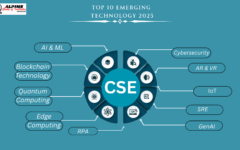Is B.Sc. IT the Right Choice for Non-Engineering Students?
2024-12-16 9:47Is B.Sc. IT the Right Choice for Non-Engineering Students?
In today’s fast-paced, technology-driven world, Information Technology (IT) is one of the most sought-after fields of study. Many students tend to gravitate towards engineering degrees when considering careers in tech, but not everyone is inclined towards engineering or math-heavy courses. For those who are passionate about technology but aren’t particularly inclined toward engineering, a B.Sc. IT (Bachelor of Science in Information Technology) offers a great alternative.
What is B.Sc. IT?
B.Sc. IT is a three-year undergraduate program that focuses on the study of computer science, software development, networking, web development, and various other aspects of technology. Unlike traditional engineering programs that focus more on the theoretical and mechanical aspects of technology, B.Sc. IT provides a more practical and application-oriented approach to learning IT concepts.
For non-engineering students, this means less emphasis on complex mathematical concepts and more focus on learning how to apply technology to solve real-world problems.
Why B.Sc. IT is Ideal for Non-Engineering Students
If you’re someone who enjoys working with computers, programming, and solving tech problems but don’t have the interest or aptitude for engineering-specific topics, B.Sc. IT provides an ideal path. Here’s why:
1. Simplified and Practical Curriculum
B.Sc. IT is designed for students who want to understand how technology works, without necessarily getting into the heavy math and mechanical engineering aspects of the field. The curriculum often focuses on practical applications of technology, such as:
- Programming languages (Python, Java, C++)
- Database management
- Networking and system administration
- Web development
- Software development
These are all fundamental areas in IT, and while they require logical thinking, they do not demand an advanced understanding of abstract mathematics, which is typically a central component of engineering courses. This makes the B.Sc. IT program more accessible and enjoyable for non-engineering students.
2. Hands-On Learning and Real-World Skills
A major benefit of the B.Sc. IT program is its emphasis on hands-on learning. Students work with real-world technologies and tools from the very beginning. You’ll not only learn about theory but also gain practical skills in coding, software development, and system management, which are highly valued by employers.
Internships, project-based learning, and lab sessions allow students to apply their knowledge to actual problems, making them job-ready upon graduation. This focus on practical application of skills is perfect for students who want to get involved in the tech world without delving deep into the mechanical or structural components of engineering.
3. Diverse Career Opportunities
A B.Sc. IT degree opens up a wide range of career opportunities in the tech industry, many of which don’t require an engineering background. Some of the potential career paths include:
- Software Developer: Develop applications, websites, or mobile apps.
- IT Consultant: Help organizations integrate and optimize technology solutions.
- Network Administrator: Manage and maintain computer networks in organizations.
- Database Administrator: Oversee and manage large databases to ensure security, accuracy, and accessibility.
- Web Developer: Design and build websites, ensuring they are user-friendly and functional.
- Cybersecurity Analyst: Protect organizations’ data from cyber threats.
These roles require problem-solving and creativity, areas where non-engineering students can excel without the need for complex engineering theories.
4. Focus on Creativity and Innovation
While engineering programs often focus on mathematical models, design, and analysis, B.Sc. IT offers greater flexibility for students to be creative. Whether it’s building software, creating websites, or developing mobile apps, IT professionals often get to express their creativity through the solutions they design. This can be especially appealing for non-engineering students who are more inclined toward creative problem-solving and innovation.
5. Lower Barriers to Entry
Engineering degrees, especially in fields like computer science, often have a higher entry barrier in terms of subject prerequisites, including advanced mathematics and physics. On the other hand, B.Sc. IT has fewer entry requirements related to high-level math or science, making it a more accessible option for students from diverse educational backgrounds. This lower entry barrier makes it an ideal choice for non-engineering students who still want to pursue a career in technology.
6. Flexibility and Specialization
B.Sc. IT offers flexibility in choosing electives and specializations that align with individual interests. Students can specialize in fields like:
- Cloud Computing
- Artificial Intelligence
- Machine Learning
- Web and Mobile App Development
- Data Science
This allows students to build expertise in areas they find exciting, even without a formal engineering background.
7. Growing Demand for IT Professionals
The tech industry is booming, and companies are actively seeking skilled professionals in various IT-related fields. From small startups to multinational corporations, every business today relies on technology. This demand for IT professionals continues to grow, providing job security and career growth opportunities. B.Sc. IT graduates are well-equipped to meet these demands and can thrive in a variety of sectors, including finance, healthcare, education, and entertainment.
How Can Non-Engineering Students Make the Most of B.Sc. IT?
To maximize the benefits of a B.Sc. IT degree, non-engineering students should focus on a few key strategies:
- Master Core Programming Languages: Learning popular programming languages like Python, Java, and C++ is essential. It’s important to not only understand how to code but also to develop problem-solving skills through programming.
- Stay Updated on Tech Trends: The tech industry is ever-evolving, with new technologies and trends emerging constantly. Students should follow industry news, take part in online courses, and engage with communities to stay up-to-date.
- Participate in Internships: Gaining hands-on experience through internships or freelance projects is crucial. It helps build practical skills and strengthens your resume for future job opportunities.
- Join Tech Communities: Networking with industry professionals and joining coding or IT-related communities can provide valuable connections and career opportunities.
Conclusion
If you are a non-engineering student passionate about technology but not inclined towards a traditional engineering degree, a B.Sc. IT course is a fantastic option. With a practical, hands-on approach, this program provides you with the knowledge and skills needed to succeed in various IT-related roles. It opens up exciting career possibilities and ensures you’re ready to tackle the tech challenges of today and the future.
By embracing a B.Sc. IT degree, you can enter the world of technology, innovate, and contribute to the digital transformation of industries—all without the engineering-focused curriculum that may not be a perfect fit for you. The possibilities are endless, and the IT industry is waiting for fresh talent to drive its growth.









